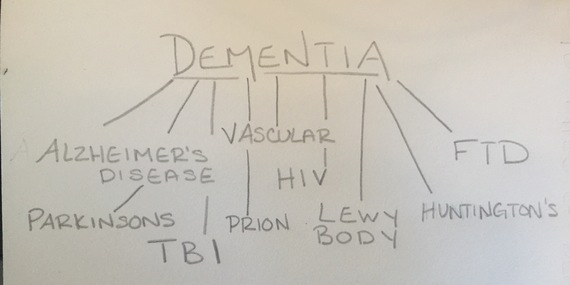Dementia, Alzheimer's, senility, forgetfulness. All of these words point to an experience. But do they point to the same one? Are they different? Are they the same?
I often hear these words thrown around interchangeably. Here I hope to give some etymological clarity. Aging in America is confusing. By using clear language, I hope we can communicate more effectively about our experiences. Through sharing experiences we also share wisdom to age more playfully.
I work in the field of psychology, which uses the DSM as its diagnostic manual. It is based on this that I will share the different types of dementia, or as it is now clinically called, neurocognitive disorder.
This brings us to our first language issue -- dementia or NCD are interchangeable and are overarching terms for all that will follow. Below are all types of dementia or subtypes of NCD.
After someone is determined to be experiencing dementia, a subtype allows the experience to be further defined according to the known or presumed cause as well as the main characteristics, timeline, and symptom set of the dementia.
Knowing a subtype can help give behaviors meaning and offer understanding, as well as offering a way to share best practices for living with dementia. There is a wealth of research on each of these. Below is a very basic overview meant to be used as a starting point of understanding.
1. Alzheimer's disease -- Alzheimer's is named for the doctor who found the pathologies believed to be the cause. Although the exact cause for the behaviors labeled as Alzheimer's is still unknown, it is thought to be inherited genetically. Alzheimer's varies from other dementias in that it's progression is steady and gradual. For a diagnosis of probable Alzheimer's (probable because the tangles from which its name is derived can only be verified during a postmortem brain autopsy) there must be a decline in memory, learning and one other domain.
2. Frontal Temporal Dementia (FTD) or Frontotemporal lobar degeneration -- This dementia is named for the part of the brain it affects most -- the frontal lobe. FTD seems to appear suddenly and then progresses gradually. There is a behavioral and language variant. The behavioral variant is marked by disinhibition and changes in social behavior. The language variant results in a dramatic change in language ranging from speech production to word comprehension.
3. Lewy Body Disease -- This type is also named for its assumptive cause -- lewy bodies in the brain. Those with Lewy Body disease experience fluctuating cognition levels. This disease is also marked by detailed visual hallucinations. These hallucinations are not psychosis. Unfortunately, antipsychotics are often given to treat these hallucinations. These drugs are contraindicated or not recommended for people with a Lewy Body diagnosis and can make symptoms worsen. Lewy Body also has features of parkinsonism. There are more physical changes associated with Lewy Body than other dementias.
The remaining types are named for their cause; their exact symptoms vary based on the area of the brain which was damaged and how extensive the damage is.
4. NCD due to vascular disease -- The onset usually coincides with a cerebrovascular event -- a disruption of blood supply to the brain, such as a stoke.
5. NCD due to traumatic brain injury -- There must be evidence of an injury to the brain such as an impact to the head, either at a single moment or repeated over time such as multiple concussions from playing a contact sport.
6. Substance or medication induced -- Damage has been done to the brain through the use of substances or medication. The symptoms remain after usual duration of intoxication or withdrawal.
7. Due to HIV infection -- There is evidence of HIV infection and the dementia is not better attributed to another type.
8. Due to Prion disease -- There is evidence of prion disease as well as rapid progression of NCD symptoms.
9. Due to Parkinson's Disease -- Parkinson's is present before the NCD.
10. Due to Huntington's Disease -- Huntington's is diagnosed before NCD, or there is family history or genetic testing to support the diagnosis.
In addition to these 10 types there are also the diagnoses of "NCD due to another medical condition" as well as "NCD due to multiple etiologies," meaning that more than one of these types are present at the same time.
Every person is unique and so is their experience of dementia.
Understanding these broad categories can help us to share experiences and find helpful resources. Only a medical doctor or licensed mental health professional can offer a diagnosis. These same people can be very helpful in connecting you to local resources such as support groups, therapeutics, educational programs and medical resources.
